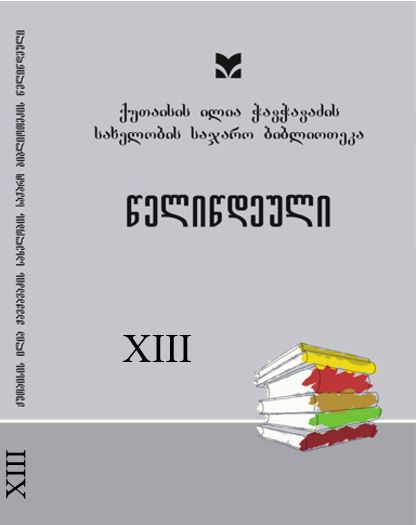პიროვნების ემანსიპაციის საკითხი ბარბარე ჯორჯაძის მსოფლმხედველობრივი აზროვნების ჭრილში
DOI:
https://doi.org/10.48614/yk.13.2021.130-138საკვანძო სიტყვები:
პიროვნების ემანსიპაცია, ბარბარე ჯორჯაძე, ქალის ფენომენიანოტაცია
The interrelationship between women and men, which is presented by Georgian writers in fiction, is considered by us as a driving force and factor in the emancipation of the individual. Our reasoning concerns our point of view and we have also chosen the material appropriate for the interpretation of our own views. Our opinion, in general, on the nature of national literature and its main factors, is based on the thoughts of Georgian classics in this direction. We believe that the examples we have discussed speak to national values, and in this respect, Georgian literature is very interesting.
We present the three most important factors from the national literature. The theme of pure love in Konstantine Gamsakhurdia’s worldview thinking implies the inner, spiritual deification of man, woman, and man. We believe that his generalized face is a natural phenomenon for the Georgian reality, and his ideological imagination in artistic creation is an irreplaceable paradigm of every time, which fulfills the didactic direction, in terms of the emancipation of the person.
The second example concerns the manifestation of the free nature of a woman’s inner nature, an incomparable example of which was given to us by Vazha-Pshavela. Aghaza’s original, free inner world is a truly irreplaceable paradigm of an emancipated woman, in the formation of which an active role belongs to a Georgian man.
The third topic reveals in a very original way the natural state of the Georgian man, and his inner character, which from our point of view we still consider in general, as one of the most important factorscharacteristics of the national literature. This is where the inner goal and strength of a Georgian person unfold. Man is inwardly mystical with the God-human beginning. Of course, all three moments are our natural state, which in no way detracts from the sense of reality.
Against the background of these discussions, by which we interpret the nature of Georgian literature in general, we see the goal of the inner spiritual set of Georgian women and men towards a common idea. This idea is a sacred idea, strictly adhered to by moral and ethical laws. Against this background, Barbare Jorjadze’s artistic vision contradicts and deviates from the common goal.
The tragic scene in the novel „Mariam“ is unacceptable for us personally, because it does not correspond to the natural state of a Georgian woman. The didactic character of Georgian literature is revealed in the spiritual unity of the man with the god-human beginning, and in the woman - in his divinity.
It is difficult to morally support a woman who has cleverly, cleverly killed a person, even an enemy of her own homeland. We think this is a writer’s childish fantasy.
Barbare Jorjadze feels and revives the Amazons in her inner world with an atavistic feeling. Of course, when discussing the nature of the worldview credo of Georgian literature, such paradigms would be unacceptable. Such is our vision.




